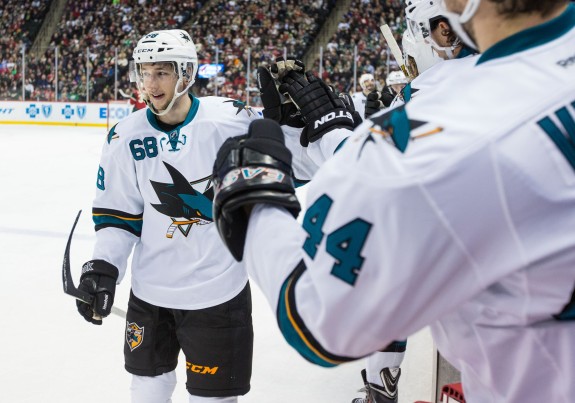
For part one of the series, click here.
San Jose’s FAs
The NHL salary cap is projected to rise to $71 million next season despite originally being predicted at closer to $73 million. However, for the purposes of this analysis, I am going to use the current salary cap ($69 million) to keep the spending assumptions on a conservative level. This leaves the San Jose Sharks $14 million to sign people in the free agency market during the offseason.
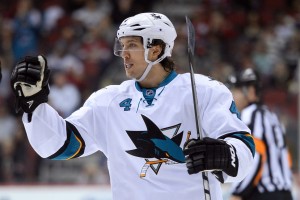
Team Teal has six players whose contracts expire in July: Melker Karlsson, John Scott, Brendan Dillon, Matt Irwin, Scott Hannan, and Antti Niemi.
Of these six skaters, the Sharks must bring back Karlsson, Dillon, and Irwin. Karlsson had a fantastic campaign last year while both Dillon and Irwin have the potential to improve immensely. They are key pieces to San Jose’s success in the seasons to come.
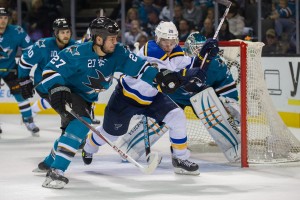
The other pending free agents have failed to perform to their expectations. As a result, they are taking up valuable cap space that could be utilized on acquiring consistent and skilled skaters during the offseason.
To the three returning players, the Sharks should offer the following contracts:
Karlsson: $1.5 million for 3 years
Dillon: $2.5 million for 3 years
Irwin: $1.5 million for 2 years
These are all fair prices with acceptable lengths that should be enough to keep these young men in Silicon Valley. Assuming these offers are accepted, this would leave San Jose with $8.5 million to play with to explore other options in the free agency market.
NHL Free Agency
The Sharks need help in all three departments–offense, defense, and goaltending–to be a threat next season. However, one of these issues can be solved using players already on the roster, while the other two can be fixed with the numerous people available in the summer.
Offense
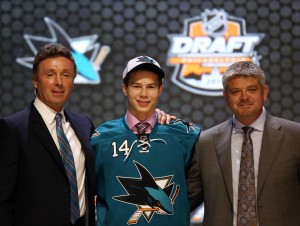
This is the position that can be remedied using skaters that are already affiliated with the organization. San Jose has a number of high quality prospects, such as Nikolay Goldobin, Daniil Tarasov, and Rourke Chartier, that can help improve the team’s desolate bottom six.
With a few tweaks to the lineup, the Sharks can have one of the deepest 12-man forward groups in the entire NHL. They just need to be smart with their lineup decisions.
More of this will be discussed in my next article tomorrow.
Defense
San Jose was plagued with terrible defense throughout last year’s campaign. They lacked depth on the right side and jeopardized Mirco Mueller’s development by not giving him a stable partner to play with–in addition to management scratching him multiple times during the season.
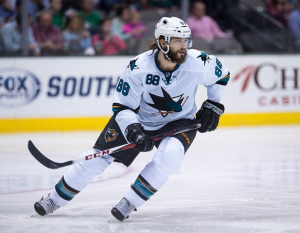
To help the club’s blue line, the Sharks need to invest in a top-four, right-handed defenseman that can play alongside Dillon on the second pair. This person must have experience and should be an offensive threat without being reckless in his own zone (*cough* Brent Burns *cough*).
Doing this accomplishes two things:
First of all, San Jose would have another legitimate second pair defenseman that could help shutdown the opposition’s shooters. This would give the team, and its fans, a sense of security even when Marc-Edouard Vlasic and Justin Braun aren’t on the ice.
The next thing that it does is that it bumps everyone on the right side down the depth chart. This should, in theory, give Mueller a better partner on the bottom pair. Having a more competent partner should help him develop into the top shutdown defenseman he is projected to be.

Of the $8.5 million the Sharks have available to use, they should allocate a maximum of $4.5 million to obtain this sought after right-handed shooter. Players that meet these qualifications in ability and price include Zybnek Michalek, Cody Franson, and Jeff Petry.
Of these candidates, Franson is probably the best choice. He has 169 points in 400 games, is a career plus-one despite playing on the Leafs for some time, and is a quality possession player.
Because he is one of the better defensemen available, he will also come with a higher price tag. There will be many teams interested in him that will be willing to spend a lot of money to have him on their roster. This is why San Jose needs to be willing to spend close to $4.5 million on the 27-year-old Canada native.
It would be expensive, but well worth it at the same time.
Goaltending
Niemi has underperformed in his time in teal, and, because of it, he should not return next season. This leaves a vacancy in the starting goaltender role that Alex Stalock is not ready to fill. The Sharks must find another netminder that can take over the lead position for the next few years.
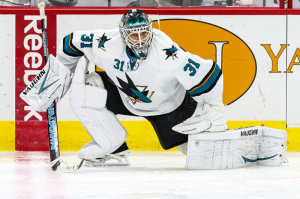
There are only two established starters available in free agency. One of which is Niemi, and the other is the Wild’s Devan Dubnyk. This leaves little to choose from in terms of people who have played in a starting role before. However, it does not mean that there aren’t any good options available.
Ideally, San Jose would search for someone who is relatively young but has played in a fair amount of games.
If the Sharks set aside $3 million to attract a starting goaltender, they would be in the financial range of names like Michal Neuvirth, Karri Ramo, and Jhonas Enroth. All three of them are under 29-years-old and have started a good number of contests for their former squads.

Of these three, Neuvirth is probably the best option available for the team. He has started 150 games in his career and registered a league average .912 SV% in that span.
On a relevant note, he earned that save percentage while playing behind a defensively mediocre Capitals club and the incompetent Sabres squad. With some solid defense in front of him, featuring Vlasic and potentially Franson, he could backstop the Sharks deep into the postseason.
Remaining Space
By spending a maximum of $7.5 million in free agency, this leaves Teal Town $1 million to give somebody like Nikolay Goldobin a permanent role on the roster. The amount the Sharks spend on free agency is also a high estimate, which means they will likely have more breathing room next season than the $1 million I left them with. Couple this in with the salary cap increasing by a couple million dollars over the summer, and the Sharks are poised to be a financially flexible team.
The fact that this franchise can acquire such talent defensively and obtain a netminder that can acclimate into the starting role quickly is a comforting thing. If management makes the right decision and elects to spend their money where it will best benefit the team, the San Jose Sharks can be elite once again. It is all up to Hasso Plattner and Doug Wilson.